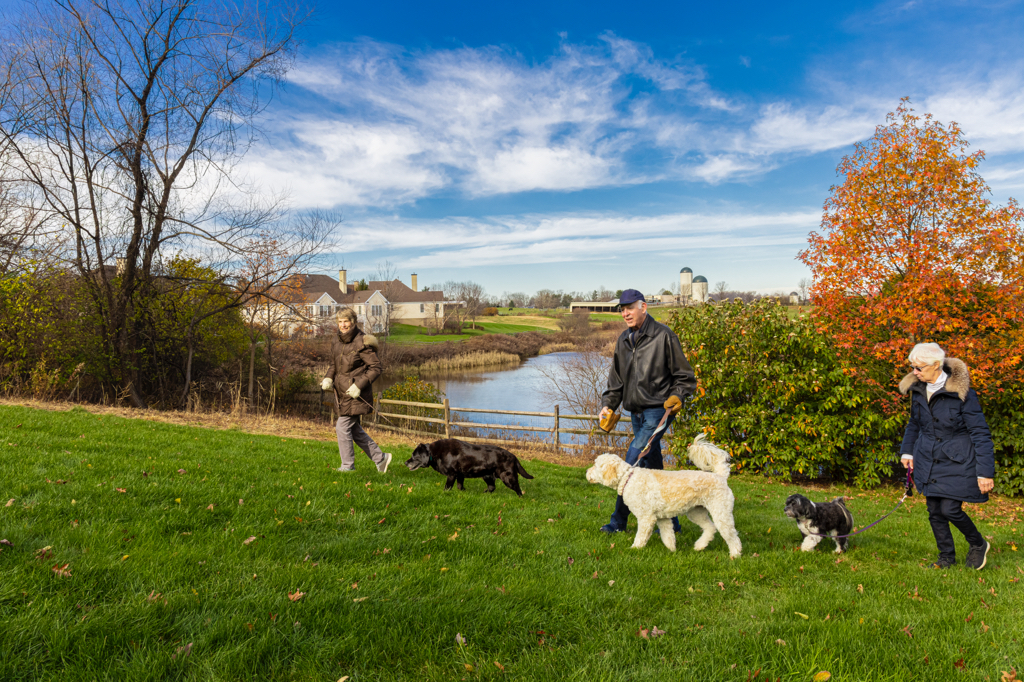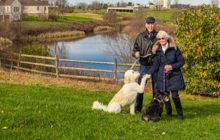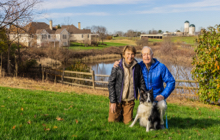The Pet Parents of
The Hill at Whitemarsh

For thousands of years, dogs have served as man’s best friend. Dogs provide their owners with a variety of benefits, including lower levels of stress and anxiety and higher levels of happiness1. For these exact reasons, it should come as no surprise that many of the residents at The Hill at Whitemarsh are pet parents.
Louise “Weezie” Johnson has raised her 14-year-old Labrador Retriever, Chloe, since she was a puppy and cannot imagine what life would be like without her.
“We decided to get Chloe because my husband was spending too much time in his office. The puppy really helped him get out for more walks,” says Weezie.
Although Weezie’s husband passed away a few years ago, Chloe has remained a steadfast companion and has helped her connect with her neighbors. She moved to a spacious villa at The Hill about a year ago, and the open space in the back for Chloe and the garden were integral parts of her decision.
“Chloe’s main job is keeping an eye out for deer and foxes,” says Weezie. “I take her on walks a couple of times a day. We both love the exercise.”
Susan Feldman has also said that being a pet parent has helped her get out of the house on a regular basis. She takes three daily walks with her two dogs, Maggie, a 6-year-old Goldendoodle, and Sophie, a 3-year-old Tibetan Terrier.
 “Maggie and Sophie get me up and out of the house every day. They keep me healthy,” Susan says. “The Hill makes it so easy to get out and walk. I love that I have the ability to walk them on paths without worrying about lots of traffic.”
“Maggie and Sophie get me up and out of the house every day. They keep me healthy,” Susan says. “The Hill makes it so easy to get out and walk. I love that I have the ability to walk them on paths without worrying about lots of traffic.”
Likewise, Ann and Frank Reed also love taking their 13-year-old Border Collie rescue, also named Chloe, out for some fresh air around the grounds.
“Ann walks Chloe in the morning for about an hour,” Frank says. “And I trained her to lead me on a walk in front of my golf cart out on the trails near here.”
If you think that pet parents at The Hill appear to get more daily exercise as a result of their dogs, you would not be wrong. In fact, a 2019 research study published in Scientific Reports2 found that “dog ownership is associated with more recreational walking and considerably greater odds of meeting [physical activity] guidelines.” The researchers—who examined the habits of both dog-owning and non-dog-owning participants in Liverpool, England—found that dog owners spend nearly 300 minutes per week walking, which is almost 200 minutes more than the non-dog owners.
 Additionally, studies have shown3 that dogs can help prevent feelings of loneliness and depression, especially in older adults. Using data from the Health and Retirement Study, researchers determined that pet ownership can provide a psychological boost. This also translates to what the general pet experience has been at The Hill during a particularly lonely time in our history.
Additionally, studies have shown3 that dogs can help prevent feelings of loneliness and depression, especially in older adults. Using data from the Health and Retirement Study, researchers determined that pet ownership can provide a psychological boost. This also translates to what the general pet experience has been at The Hill during a particularly lonely time in our history.
Susan has found that her pups have served as her main means of socialization in a time when socializing indoors has been discouraged. “I often see other pet parents out on walks with their dogs, so we can safely stop and chat from a distance. It’s been a saving grace.”
Weezie agrees with Susan about the impact that her dog has had on her social life at The Hill. “Chloe provides me with great companionship,” Weezie says. “But she’s also allowed me to connect with other people at The Hill.”
Frank and Ann say that having Chloe has been helpful during the pandemic because “we have someone else to share our life with. She just listens without talking back and loves us unconditionally.”
That last sentiment is one that all of the neighbors share about pet ownership; the unconditional love they receive from their dogs is unparalleled.
“I am never lonely because of them,” says Susan. “One of them is always by my side, and I wouldn’t want it any other way.”